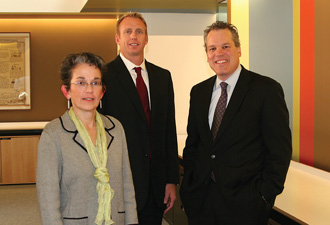
Andrea Wickerham, J.D., Vice President; Christopher Guinty, Esq., Vice President; Frank Uryasz, CAE, President.
Drug Free Sport
In a company blessed with—and beset by—growing pains, Frank Uryasz set about to identify barriers to organizational
efficiency a few years after launching Drug Free Sport in 1999. To his surprise, he found one of those impediments in the mirror: “I suppose in some ways, I was the biggest barrier—it is difficult to let go,” he confesses.
Drug Free Sport does just what the name says; it administers drug-testing programs for amateur and professional athletic organizations, and Uryasz hit the market at almost exactly the right time. The nation’s attention was focusing on banned substances and enhanced performances in various sports, and Uryasz, true to the definition of entrepreneur, moved quickly to seize an opportunity. But the demand for his services compelled a restructuring a few years ago, and it was challenging, he said, because up to that point “every staff member had the president’s ear. I had too many people reporting directly to me and we needed to restructure so that decisions could be made more quickly and I could preserve my sanity.”
To grow, Uryasz needed it to be less reliant on his own involvement in everyday matters. He still maintains a daily presence, he said, “which ensures my vision is present in the decisions we make.” But now, much of the up-the-line reporting goes to two vice presidents who understand the way he thinks.
And it’s worked: From $3.5 million in revenues in 2000, the company’s gross has grown fivefold. Today, its roster of clients reads like the score-update ticker on ESPN, with virtually every bedrock entity in organized professional and amateur athletics in America: the NFL, Major League Baseball, the NBA, the Big XII and Big Ten athletic conferences, the NCAA itself, the PGA and LPGA, and more. The company provides those clients an extra measure of integrity, ensuring that the playing fields truly are level with respect to individual performance.
Perhaps as important as the two dozen people now on staff, Uryasz says, are those he pays for advisory services. About the most important suggestion he would offer to anyone in business would be to “surround yourself with good advisers. I couldn’t have done it without my accountants, attorneys, bankers, IT experts and insurance advisers.
“If these advisers can’t help you grow the company or grow along with it,” Uryasz counsels, “find new advisers.”

Adam Coomes, President; Justin Graves, CEO.
Infegy
He’s still in his 20s, but Justin Graves has figured out something that a lot of business owners don’t get until the banker takes back the keys to their building.
“Definitely be ready to commit,” the 26-year-old CEO of Infegy advises anyone considering business ownership. “This company is nearly my entire life, and has been for almost four years. It is very hard to kick-start a company on 40 hours a week!”
The company has more than quadrupled its revenues over the past year. That has allowed Graves and co-founder Adam Coomes, who serves as president, to pump nearly all the profit back into continued program development, new hires and, nearly as important, improved benefits. That keeps people invested in their work at Infegy, he said.
There’s no getting around it: The cloak of anonymity provided by the Internet can bring out the worst in people. Often, social-media postings, bulletin boards and blog commentary produce little more than hurt feelings. But real damage can be inflicted on a business, and Graves knows that executives ignore that potential at their own peril.
That was the inspiration for launching Infegy in 2007 (the name, by the way, blends “information” and “strategy”). Its social-radar programs provide almost immediate feedback to corporations on what’s being said about them on-line—bad or good—by sifting millions of Internet postings every day. Already, the company has established a presence in Europe, where Graves sees even greater opportunities than in the U.S.
The key factors that helped get the company up and running? “Good relationships,” Graves says. “Early on, we reached out for help and advice in areas where knowledge was weak. This was a huge help in getting us going quickly and with fewer problems.”
But it all starts with commitment, Graves said.
“In a young startup, the founders will inevitably end up assuming many roles, so you have to be willing to spend the time to perform all of those roles to a high level,” Graves said. “Dedication is key.”